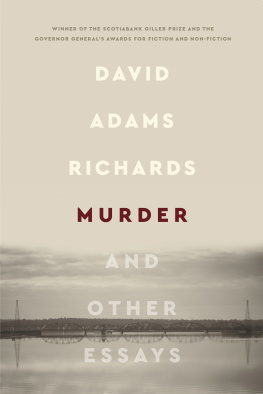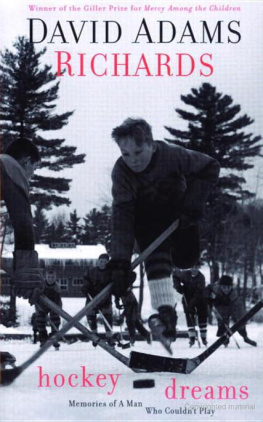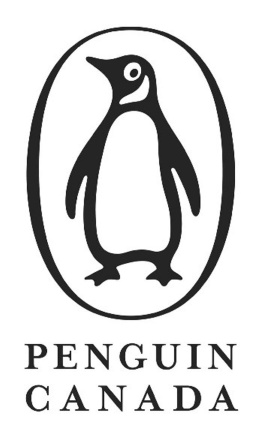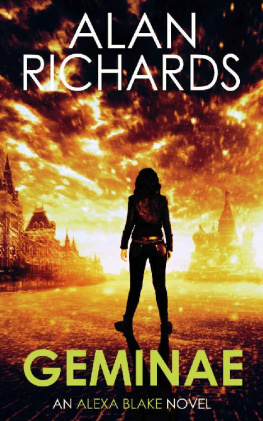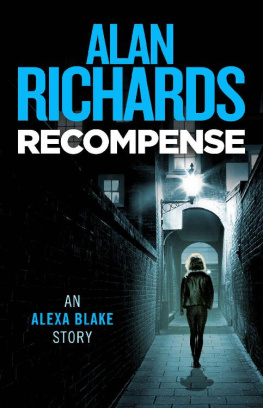David Adams Richards - Facing the Hunter
Here you can read online David Adams Richards - Facing the Hunter full text of the book (entire story) in english for free. Download pdf and epub, get meaning, cover and reviews about this ebook. year: 2011, publisher: Doubleday Canada, genre: Detective and thriller. Description of the work, (preface) as well as reviews are available. Best literature library LitArk.com created for fans of good reading and offers a wide selection of genres:
Romance novel
Science fiction
Adventure
Detective
Science
History
Home and family
Prose
Art
Politics
Computer
Non-fiction
Religion
Business
Children
Humor
Choose a favorite category and find really read worthwhile books. Enjoy immersion in the world of imagination, feel the emotions of the characters or learn something new for yourself, make an fascinating discovery.

- Book:Facing the Hunter
- Author:
- Publisher:Doubleday Canada
- Genre:
- Year:2011
- Rating:5 / 5
- Favourites:Add to favourites
- Your mark:
- 100
- 1
- 2
- 3
- 4
- 5
Facing the Hunter: summary, description and annotation
We offer to read an annotation, description, summary or preface (depends on what the author of the book "Facing the Hunter" wrote himself). If you haven't found the necessary information about the book — write in the comments, we will try to find it.
Facing the Hunter — read online for free the complete book (whole text) full work
Below is the text of the book, divided by pages. System saving the place of the last page read, allows you to conveniently read the book "Facing the Hunter" online for free, without having to search again every time where you left off. Put a bookmark, and you can go to the page where you finished reading at any time.
Font size:
Interval:
Bookmark:
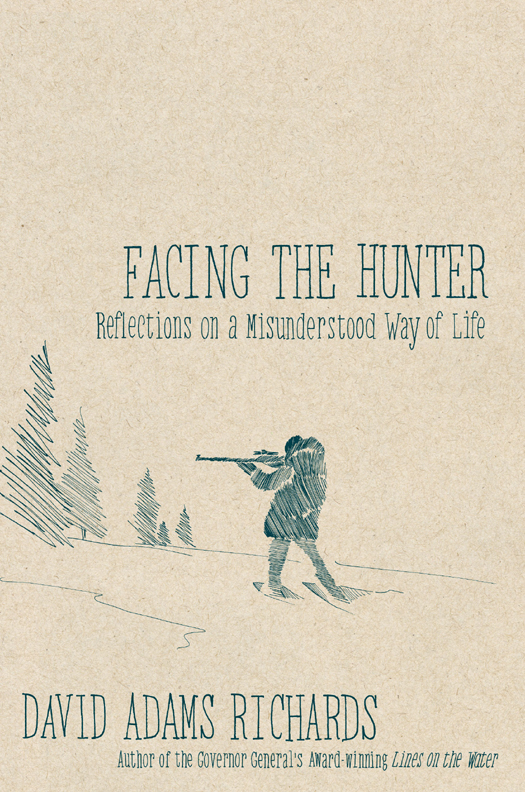
BY THE SAME AUTHOR
NON-FICTION
Hockey Dreams
Lines on the Water
God Is.
FICTION
The Coming of Winter
Blood Ties
Dancers at Night: Stories
Road to the Stilt House
Nights Below Station Street
Evening Snow Will Bring Such Peace
For Those Who Hunt the Wounded Down
Hope in the Desperate Hour
The Bay of Love and Sorrows
Mercy Among the Children
River of the Brokenhearted
The Friends of Meager Fortune
The Lost Highway
Incidents in the Life of Markus Paul
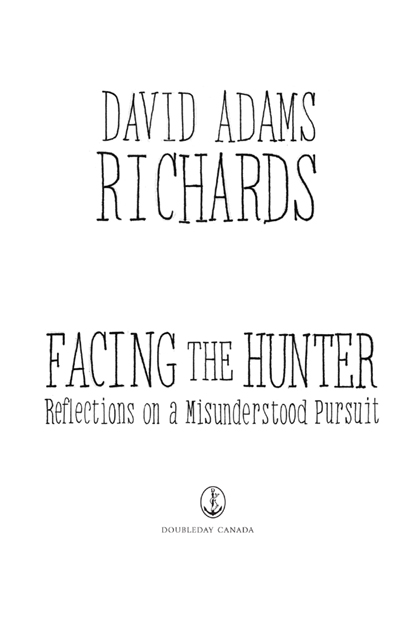
Copyright 2011 Newmac Amusement Inc.
All rights reserved. The use of any part of this publication, reproduced,
transmitted in any form or by any means electronic, mechanical,
photocopying, recording or otherwise, or stored in a retrieval system
without the prior written consent of the publisheror in the case of
photocopying or other reprographic copying, license from the Canadian
Copyright Licensing Agencyis an infringement of the copyright law.
Doubleday Canada and colophon are registered trademarks
Library and Archives Canada Cataloguing in Publication
Richards, David Adams, 1950
Facing the hunter / David Adams Richards.
eISBN: 978-0-385-67613-7
1. HuntingCanada. 2. Richards, David Adams, 1950-. I. Title.
SK151.R53 2011 799.2971 C2011-900124-1
Published in Canada by Doubleday Canada,
a division of Random House of Canada Limited
Cover design and art: Andrew Roberts
Visit Random House of Canada Limiteds website: www.randomhouse.ca
v3.1
For Giles Kenny, Gary Wood, Ed McIntyre
Progressive is such a damnable word. In the middle-class lexicon progressive now means that most of the people I have known and loved are somehow less than others, who think and rationalize about compassion and fairness.
As a case in point, I grew up with boys from rural New Brunswick who would bring their guns to school, so they could hunt on the way back home. I know we cannot do this todayI am not saying we should. But rifles were not something naturally feared when I was a boy. They became a part of a society feared by whole sections of intellectuals, who tell us that it is only conservatives and right-wingers who are paranoid about the other. Most of the people determined to align rifles with murder and thugs have never handled riflesand dont know the differences between them. In our modern novels, most often the hunter is also the subhuman, not a man of any grace or courageunless the hunter is a First Nations man. They cannot be seen to be the other. Of course I am not saying they should ever bebut in a strange paradox, First Nations people are actually recognized as other by many academics now, because of a kind of moral favouritism.
But there is little favouritism shown to those who wish to stop the gun registry. Those who want that are, well, conservative, and less compassionate. And they do not think like us, the fair-minded ones.
A few years back I was in a house in Edmonton, Alberta, overhearing how deplorable it was for men to work in the oil patch, to hunt with weapons, to kill the ecology we all must share. It was as if I was listening to a lecture directed at me by a neophyte poet across the room. The poet who was deploring all of this was warmed by oil and well fed by buffet and had a captive audience everywhere about him that night, as he sipped a Chardonnay. Of course I suspect in his whole life he had never gotten truly drunk, or at least never gone on one. And he lived in a society every bit as closeted and insulated as did those tenured clerics in the time of Old John of Gaunt. Perhaps he never considered this.
I suppose I have always disliked men like this, clever enough to have expensive cloth covering their arses, and pleased to carry with them a register of human complaint and a suspicion of certain jobs and of so, so many people. Their ideals are those of a subversion to a tradition that, so often, they have never themselves encountered. They are the transgressionalists who have chosen their targets very carefully, so as never to be alone. It is a very strange way to show liberal empathy. Which, of course, is what they promote among themselves. Or at least what that poet promoted that evening.
Still, my ideas wouldnt be readily accepted that night.
If rifles fit in with his admonishing, so hunting must as well. And it is not in any way my policy to convince anyone that hunting is noble, or that hunting cannot be wilfully cruel. My only suggestion to the world is that those who eat meat should be morally obligated to kill at least once in their lives that which they eat. After two months without oil, as ill conceived as the oil patch is and as ill fated as our time-honoured traditions seem to be, that generous poet would no longer be sipping his wine at the buffet deploring those without his intellectual and sarcastic capacity. And those women who surrounded him, nodding their heads at those terrible people he got to skewer, all of them I am sure would be somewhere else.
I have not hunted seriously in a long time. Friends have stopped phoning me to go out. I do not know at this moment when or how much I will hunt again.
This is some of my story about how and why I hunted, long ago.
I suppose the very first animal I saw killed and in the back of a truck was a bull moose, sometime in the early 1950s. The blacksmith who lived next door to us on Blanche Street shot it. My father at that time went hunting every yearand it caused much excitement when he left, and came back. I remember seeing his rifle standing in the hallway between the kitchen and living room. The fact that you needed to be strong to carry it around gave it credibility. And we knew instinctively that it was his rifle and not ours to touch.
He was a deer hunter mainly (he shot a deer on the day I was born, October 17, 1950). After a time, as it does with most people, hunting became a thing of his youth, and he put his rifle away, about the time I shot my first deer.
The men next door to us hunted until they were much older. A woman we knew, up near the first house I lived at, was a very great hunter. I remember the eight-point buck she shot. They took a picture of it for the paper with her standing alongside it. She went hunting mainly with her brother. Sometimes her brother went into the camp by himself for a week with no transportation. She was an unmarried lady, and of course much talking there was about her. But she was a good fisherman and a fine shot with a rifle. My aunt, my mothers youngest sister, hunted birds in the fall. She too was an unmarried woman who lived up on a stretch of the Matapdia. She was away fishing in the spring of the year, and she could tie her own flies. She was not the fisher-person her brothers were, but then again she didnt have to be. She could cast a good line and work a pool well, and she took her own rifle to hunt her own game in the fall, mainly partridge up on the ridges above her house.
All of these people were people of my youth whom I respected a good deal. The woods had secret places that laid the framework of the template of my life. There were here many famous New Brunswick guides, and a grand amount of wisdom about the hunt. But there was, still and all, a good deal of wisdom from those who did not guide, as well. When I was a child, the caribou were a distant memory, a grand animal of the barrens, drifting away like an image in an old photo. Or their racks were in houses I sometimes visited. Distant themselves now.
Font size:
Interval:
Bookmark:
Similar books «Facing the Hunter»
Look at similar books to Facing the Hunter. We have selected literature similar in name and meaning in the hope of providing readers with more options to find new, interesting, not yet read works.
Discussion, reviews of the book Facing the Hunter and just readers' own opinions. Leave your comments, write what you think about the work, its meaning or the main characters. Specify what exactly you liked and what you didn't like, and why you think so.

